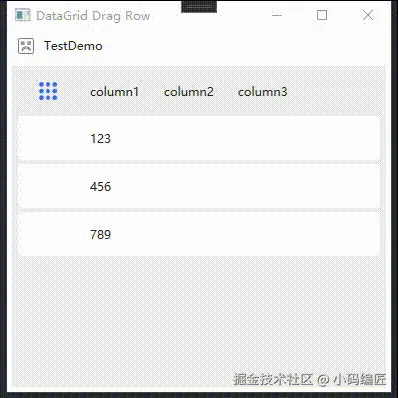WPF中实现DataGrid行拖拽功能的完整方案
目录
- 前言
- 实现效果
- 核心实现
- 1、定义拖拽行为类
- 2、UI工具类
- 3、XAML中使用
- 实现原理
- 关键特性
- 总结
前言
在wpF应用开发中,DataGrid是一个常用的数据展示控件。然而,原生的DataGrid并不支持行拖拽功能,这在需要调整行顺序的场景中显得尤为不便。
本文将介绍如何实现一个优雅的DataGrid行拖拽功能,使用户可以通过拖拽操作轻松调整行顺序。该方案基于开源项目实现,使用MIT协议的HandyControl样式库,具有良好的可扩展性和实用性。
实现效果

核心实现
1、定义拖拽行为类
public static class DragDropRowBehavior
{
private static DataGrid dataGrid;
private static Popup popup;
private static bool enable;
private static object draggedItem;
public static object DraggedItem
{
get { return DragDropRowBehavior.draggedItem; }
set { DragDropRowBehavior.draggedItem = value; }
}
// 定义PopupControl附加属性
public static readonly Depend编程客栈encyProperty PopupControlProperty =
DependencyProperty.RegisterAttached("PopupControl", typeof(Popup),
typeof(DragDropRowBehavior), new UIPropertyMetadata(null, OnPopupControlChanged));
public static Popup GetPopupControl(DependencyObject obj)
{
return (Popup)obj.GetValue(PopupControlProperty);
}
public static void SetPopupControl(DependencyObject obj, Popup value)
{
obj.SetValue(PopupControlProperty, value);
}
private static void OnPopupControlChanged(DependencyObject depObject, DependencyPropertyChangedEventArgs e)
{
if (e.NewValue == null || !(e.NewValue is Popup))
{
throw new ArgumentException("Popup Control should be set", "PopupControl");
}
popup = e.NewValue as Popup;
dataGrid = depObject as DataGrid;
if (dataGrid == null) return;
if (enable && popup != null)
{
dataGrid.BeginningEdit += OnBeginEdit;
dataGrid.CellEditEnding += OnEndEdit;
dataGrid.MouseLeftButtonUp += OnMouseLeftButtonUp;
dataGrid.PreviewMouseLeftButtonDown += OnMouseLeftButtonDown;
dataGrid.MouseMove += OnMouseMove;
}
else
{
编程客栈 dataGrid.BeginningEdit -= OnBeginEdit;
dataGrid.CellEditEnding -= OnEndEdit;
dataGrid.MouseLeftButtonUp -= OnMouseLeftButtonUp;
dataGrid.MouseLeftButtonDown -= OnMouseLeftButtonDown;
dataGrid.MouseMove -= OnMouseMove;
dataGrid = null;
popup = null;
draggedItem = null;
IsEditing = false;
IsDragging = false;
}
}
// 定义Enabled附加属性
public static readonly DependencyProperty EnabledProperty =
DependencyProperty.RegisterAttpythonached("Enabled", typeof(bool),
typeof(DragDropRowBehavior), new UIPropertyMetadata(false, OnEnabledChanged));
public static bool GetEnabled(DependencyObject obj)
{
return (bool)obj.GetValue(EnabledProperty);
}
public static void SetEnabled(DependencyObject obj, bool value)
{
obj.SetValue(EnabledProperty, value);
}
private static void OnEnabledChanged(DependencyObject depObject, DependencyPropertyChangedEventwww.devze.comArgs e)
{
if (e.NewValue is bool == false)
throw new ArgumentException("Value should be of bool type", "Enabled");
enable = (bool)e.NewValue;
}
public static bool IsEditing { get; set; }
public static bool IsDragging { get; set; }
private static void OnBeginEdit(object sender, DataGridBeginningEditEventArgs e)
{
IsEditing = true;
if (IsDragging) ResetDragDrop();
}
private static void OnEndEdit(object sender, DataGridCellEditEndingEventArgs e)
{
IsEditing = false;
}
private static void OnMouseLeftButtonDown(object sender, MouseButtonEventArgs e)
{
if (IsEditing) return;
var row = UIHelpers.TryFindFromPoint<DataGridRow>((UIElement)sender, e.GetPosition(dataGrid));
if (row == null || row.IsEditing) return;
IsDragging = true;
DraggedItem = row.Item;
}
private static void OnMouseLeftButtonUp(object sender, MouseButtonEventArgs e)
{
if (!IsDragging || IsEditing) return;
dataGrid.Cursor = Cursors.Arrow;
var targetItem = dataGrid.SelectedItem;
if (targetItem == null || !ReferenceEquals(DraggedItem, targetItem))
{
var targetIndex = ((dataGrid).ItemsSource as IList).IndexOf(targetItem);
((dataGrid).ItemsSource as IList).Remove(DraggedItem);
((dataGrid).ItemsSource as IList).Insert(targetIndex, DraggedItem);
dataGrid.SelectedItem = DraggedItem;
}
ResetDragDrop();
}
private static void ResetDragDrop()
{
IsDragging = false;
popup.IsOpen = false;
dataGrid.IsReadOnly = false;
}
private static void OnMouseMove(object sender, MouseEventArgs e)
{
if (!IsDragging || e.LeftButton != MouseButtonState.Pressed) return;
if (dataGrid.Cursor != Cursors.SizeAll) dataGrid.Cursor = Cursors.SizeAll;
popup.DataContext = DraggedItem;
if (!popup.IsOpen)
{
dataGrid.IsReadOnly = true;
popup.IsOpen = true;
}
Size popupSize = new Size(popup.ActualWidth, popup.ActualHeight);
popup.PlacementRectangle = new Rect(e.GetPosition(dataGrid), popupSize);
Point position = e.GetPosition(dataGrid);
var row = UIHelpers.TryFindFromPoint<DataGridRow>(dataGrid, position);
if (row != null) dataGrid.SelectedItem = row.Item;
}
}
2、UI工具类
public static class UIHelpers
{
// 查找父元素
public static T TryFindParent<T>(DependencyObject child) where T : DependencyObject
{
DependencyObject parentObject = GetParentObject(child);
if (parentObject == null) return null;
T parent = parentObject as T;
if (parent != null) return parent;
else return TryFindParent<T>(parentObject);
}
public static DependencyObject GetParentObject(DependencyObject child)
{
if (child == null) return null;
if (child is ContentElement contentElement)
{
DependencyObject parent = ContentOperations.GetParent(contentElement);
if (parent != null) return parent;
if (contentElement is FrameworkContentElement fce)
return fce.Parent;
}
return VisualTreeHelper.GetParent(child);
}
// 更新绑定源
public static void UpdateBindingSources(DependencyObject obj, params DependencyProperty[] propepythonrties)
{
foreach (DependencyProperty depProperty in properties)
{
BindingExpression be = BindingOperations.GetBindingExpression(obj, depProperty);
if (be != null) be.UpdateSource();
}
int count = VisualTreeHelper.GetChildrenCount(obj);
for (int i = 0; i < count; i++)
{
DependencyObject childObject = VisualTreeHelper.GetChild(obj, i);
UpdateBindingSources(childObject, properties);
}
}
// 从指定点查找元素
public static T TryFindFromPoint<T>(UIElement reference, Point point) where T : DependencyObject
{
DependencyObject element = reference.InputHitTest(point) as DependencyObject;
if (element == null) return null;
else if (element is T) return (T)element;
else return TryFindParent<T>(element);
}
}
3、XAML中使用
<Grid Grid.Row="1" Margin="5">
<!-- 拖拽提示Popup -->
<Popup x:Name="popup1" AllowsTransparency="True"
IsHitTestVisible="False" Placement="RelativePoint"
PlacementTarget="{Binding ElementName=dataGrid1}">
<Textblock Margin="8,0,0,0" VerticalAlignment="Center"
FontSize="14" FontWeight="Bold" Text="Dragging..." />
</Popup>
<!-- 启用拖拽行为的DataGrid -->
<DataGrid x:Name="dataGrid1"
controlEx:DragDropRowBehavior.Enabled="True"
controlEx:DragDropRowBehavior.PopupControl="{Binding ElementName=popup1}"
AutoGenerateColumns="False"
ItemsSource="{Binding ListItem}"
RowHeaderWidth="60">
<DataGrid.Columns>
<DataGridTextColumn Binding="{Binding Column1}" Header="column1" />
<DataGridTextColumn Binding="{Binding Column2}" Header="column2" />
<DataGridTextColumn Binding="{Binding Column3}" Header="column3" />
</DataGrid.Columns>
</DataGrid>
</Grid>
实现原理
1、拖拽开始:用户按下鼠标左键时,记录被拖拽的行(OnMouseLeftButtonDown)
2、拖拽过程:鼠标移动时显示提示Popup并更新位置(OnMouseMove)
3、拖拽结束:释放鼠标时交换行位置(OnMouseLeftButtonUp)
4、状态管理:使用IsEditing和IsDragging标志管理编辑与拖拽状态
5、UI辅助:通过UIHelpers类在可视化树中查找元素
关键特性
可视化反馈:拖拽时显示"Dragging..."提示
编辑支持:编辑状态下自动禁用拖拽功能
平滑交互:拖拽过程中光标自动切换为"SizeAll"样式
行定位:自动定位鼠标悬停位置的行
总结
本文介绍了WPF DataGrid行拖拽功能的完整实现方案。该方案通过附加行为的方式扩展了DataGrid的功能,使其支持行拖拽操作。
关键点包括:
1、使用附加属性实现功能解耦
2、通过Popup提供拖拽视觉反馈
3、利用UIHelpers工具类简化可视化树操作
4、正确处理编辑与拖拽的冲突
该实现方案具有较好的可复用性,只需在DataGrid上设置附加属性即可启用拖拽功能,无需修改原有业务逻辑。
以上就是WPF中实现DataGrid行拖拽功能的完整方案的详细内容,更多关于WPF DataGrid行拖拽功能的资料请关注编程客栈(www.devze.com)其它相关文章!






 加载中,请稍侯......
加载中,请稍侯......
精彩评论